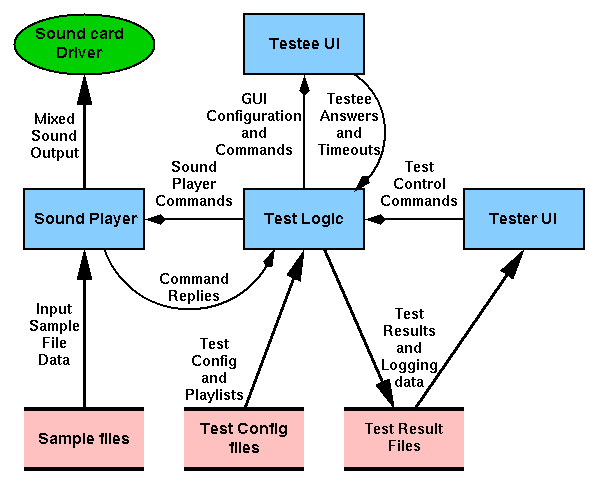Tik-76.115 Individual Project: Guinea Pig
$Id: index.html,v 1.11 1996/04/22 19:22:22 jrintafi Exp $

|
Guinea Pig - Overview
- guinea pig n
- 1: a small stout-bodied short-eared nearly tailless
domesticated rodent (Cavia cobaya) often kept as
a pet and widely used in biological research
2: a subject of scientific research, experimentation, or
testing
- Webster
|
The goal of the
Guinea Pig
project is to build a system that makes easier to create
psychoacoustical listening test by taking care of some tedious routine
tasks like creation of playlists. System will also automate the running of
these tests. A variety of test types has been implemented
including:
- A/B: Test in which the test subject
chooses one out of two samples played to him/her.
- A/B/X: Test in which the sample X is the same
sample as A or B. Testee chooses which one sample X is.
- A/B/C: Test in which A is the reference sample
and the testee chooses how much samples B and C (one of which is
the same sample as A) resemble the reference sample A.
- A/B Scale: An A/B test in which testee gives
his/her answer for both samples on a scale specified by the
test creator.
Following Test types have been left as an exercise to the reader (or to the
future development projects):
- Audiometry: The standard psychoacoustics test
specified by the ISO 8253 standard.
- TAFC (Two alternatives forced choice): Test
in which two samples are played altering some parameter, until
testee can no longer hear difference between the samples.
- Threshold: In these tests the testee can
alter one parameter of the samples played, until a treshold
of the test question is reached.
Traditional procedure when making listening tests is such that the
tester edits and records the whole test on a DAT-tape that is then played to
the test subject. The test subject listens to the test and marks
his/hers answers on paper. The tester then has to enter the answers
manually to a computer to analyze them. Guinea Pig
eliminates the need to edit the whole test into a tape beforehand and
removes the manual entering of the results. Also the test doesn't need
to be the same for all subjects. The order, in which the individual
test items consisting of sound samples are presented to the subject, can
be arranged to be
different for each subject (randomizing the order can be
done automatically).
The first phase is the
test creation where
the tester selects the test type, used sound samples and
other test parameters. As the result configuration files are
generated that contain the parameters needed in the test.
The test is then run for
each test subject and results are saved.
After the tests have been performed the results can be studied,
processed and
analyzed with some statistical programs such as SAS or Excell.
System architecture
Below is picture that describes the architecture of the test running
system. Testee listens to the sounds produced by the
Sound Player module,
and gives his/her answers to test questions with the help of
Testee UI module.
Test Logic module
coordinates the activities according to instructions
given in
test configuration files
. Test Logic also collects the test results
from the testee and stores them into the test
result files
. Tester can monitor test progress by reading test
result files.

Environment
Next the systems hardware and software issues are discussed.
Hardware
The system runs on a PC with Linux as
the operating system. For audio output
Turtle Beach
Monterey sound card
is used. However, since the sound card has no official Linux support and
Linux's audio support is quite minimal this is not the ideal environment
for the system. We hope that we'll be able to migrate to a Silicon Graphics platform in the future. SGI
has quite a good support for audio and also real time audio
processing which would be beneficial in our project.
Software
We have selected
Python
as the primary programming language for our projects. Python is a
high-level, interpreted, object oriented,
etc. language with many nice features. User interfaces can be easily
created with Python's Tkinter (from Tk/Tcl) package.
Critical parts of the system are written in C (the Sound Player).
A converter will be provided that converts the result files produced by the
system into a format understood by
SAS. Also
Matlab can be used.
·
Document index
·
Guinea Pig
·
